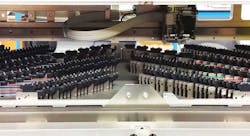Startups Foresee Future Where AI, Robots Manage Data Centers
SAN FRANCISCO – Can artificial intelligence and robots help manage the data centers of the future? Several data center companies are working to take automation to the next level, leveraging machine learning and robotics to push the boundaries of “lights out” data center operation.
These technologies were in focus at the Infrastructure Masons meeting Monday at DCD Webscale, where LitBit and Wave2Wave outlined ambitious plans to streamline data center management and address the industry’s staffing challenges.
LitBit founder and CEO Scott Noteboom shared his vision to use artificial intelligence (AI) to extend the capabilities of data center teams. Noteboom said Litbit’s AI technology can turn machines into collaborative AI-driven “co-workers” with human-like senses that can clone the expertise of employees to create a new AI-empowered workforce.
“Let’s enable an AI that can keep an eye on our data centers 24 by 7,” said Noteboom, a veteran of data center teams at Yahoo and Apple. “In the future, every single one of us will have AIs that work for us.”
Training AI for Data Center Automation
LitBit is a startup from San Jose that has developed AI agents that absorb subject matter expertise and train algorithms to manage tasks in data centers. As an example, a data center technician can create an AI agent and teach it to use sensors, sound and computer vision to collect data and respond to changes in the environment. The new AI co-worker can then be used to extend the employee’s skills, covering an overnight shift or managing a new data hall.
The LitBit agent, known as Dac, would allow data center operators to use AI to scale their operations, creating agents for a variety of monitoring and management tasks. Dac can integrate with third-party services, sending messages through Slack or implementing voice commands via the Amazon Echo.
LitBit founder and CEO Scott Noteboom speaks at the DCD Webscale conference in San Francisco. (Photo: Rich Miller)
“Dac can be put to work at any global location with the click of a button, and can cost less than a cup of coffee per day to do its job,” Noteboom writes in a blog post announcing the product. “Everything Dac is taught is through a simple and mobile human-to-machine learning interface that anyone can use – no programming, code, data science or algorithms necessary. This has allowed Dac to be mentored by some of the best in the world, and he’s easily managed by any data center manager. This extensive knowledge, combined with real-time natural language and cognitive compute capabilities, enable Dac to process many thousands of data center specific thoughts per second.”
This could allow data center operators to use AI to scale their operations, creating agents for a variety of monitoring and management tasks. The end result would be a library of agents trained in data center management, which could be mixed and matched to create an AI-powered admin and support team.
“These digital personas are going to be the app store of the future,” Noteboom told the Infrastructure Masons. Managers can subscribe to specific co-workers tailored to their facility’s staffing needs, and download the new capability – kind of like Neo learning kung fu in “The Matrix.”
Noteboom sees a huge opportunity in sharing the industry’s collective insights, creating a standard set of agents to automate common tasks. “It could be interesting to open source this for all the data centers in the world,” he said.
What About Jobs?
AI-powered services like Dac create huge opportunities, but also major concerns. Creating trained agents to perform employees’ job functions makes that worker extendable, but also replaceable. Researchers and sociologists are grappling with the workforce implications of these technologies, and their impact on employment and the job market.
Noteboom says the data center sector is an industry where AI agents can be additive, helping companies address challenges in scaling infrastructure to keep pace with torrid growth in cloud computing.
“Tools brought the cloud together,” he said. “This allowed us to grow without adding a lot of people.
“Dac was built to help cover human skill gaps, do work that people shouldn’t have to or don’t want to do, work in places where people aren’t around or during shifts when people can’t be afforded,” Noteboom notes. “In essence, Dac was created to allow people to focus on more interesting and new things.”
He also argued that the data center industry faces not just a skills gap, but a geography problem.
“The cloud is getting distributed and going to new places,” said Noteboom. “When you open a site, that expertise doesn’t exist in new markets. When you’re building in Prineville, Oregon, finding talent can be pretty tough. When we went into new markets, we would have to move people into these markets.”
Monitoring A Million Mice
Dac builds on capabilities LitBit developed in an agent called Viv, which helps monitor vivariums for a leading medical laboratry. Vivariums are massive facilities used to breed mice for scientific testing, which are curated for specific research in cancer, cardiovascular disease, and neurobiology.
“These mice are mission critical,” said Noteboom, who said Viv uses sensors to identify issues in the vivarium. Ultrasonic microphones can detect squeals that indicate mice are in stress, or fighting. Infrared cameras can watch levels in water bottles, a key maintenance task.
“We’re enabling the AI to have senses that can be distributed across a vivarium with a million mice,” said Noteboom.
The same principles can be applied to a data center with a million servers, he said. Sensors could detect vibrations that may affect hard disk drive, or noises typical of a power supply failure.
Robotic Meet Me Rooms Ahead?
The Infrastructure Masons also heard from David Wang, founder and chief executive officer of Wave2Wave, a cable products company from Milpitas, Calif. Wave2Wave offers ROME (Robotic Optical Management Engine), a tool to automate network connections in data center Meet Me Rooms.
The ROME 500 robotic connection management system. (Photo: Wave2Wave)
The ROME 500 is a 10 rack unit chassis that uses robotic arms to manage cross connections. A separate 1U chassis houses a Logical Control Unit (LCU) with CPU, memory, operating system and ROME software, as well as redundant power feeds and network and console interfaces.The ROME software understands the mechanical matrix within the chassis, and the robot can manage cables and slack with precision.
“The robot can make connections in seconds,” said Wang. “There are many places in the data center space where automation has to happen. We need robotics technology and AI technology to give us help.”
Wave2Wave has been in the data center cabling business since 2003, and entered the robotics market with its 2014 acquisition of Israeli startup FiberZone Networks. Wave2Wave says Rome has been deployed in both technology labs and mission-critical data centers. production data centers.
Both Noteboom and Wang said the technologies discussed are DCD Webscale are just the beginning of the innovation in data center automation.
“It’s a fascinating area,” said Wang. “My case may serve as a small inspiration to the industry.”
About the Author


